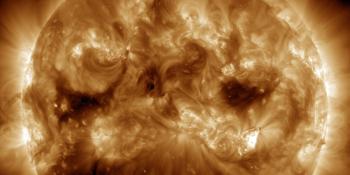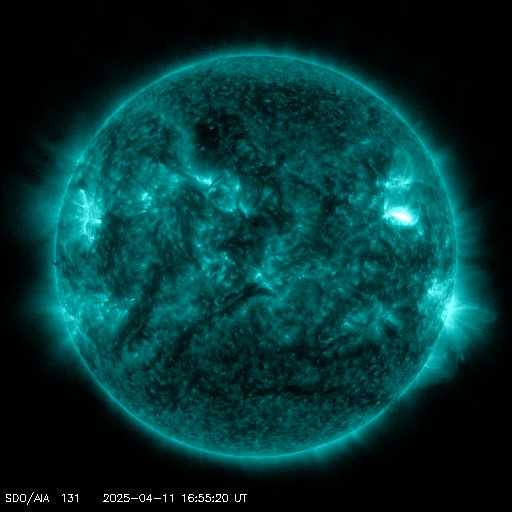Viewing archive of Wednesday, 18 November 2020
Daily bulletin on solar and geomagnetic activity from the SIDC
Issued: 2020 Nov 18 1231 UTC
SIDC Forecast
Solar flares
Quiet conditions (<50% probability of C-class flares)
Geomagnetism
Quiet (A<20 and K<4)
Solar protons
Quiet
| 10cm flux | Ap | |
|---|---|---|
| 18 Nov 2020 | 079 | 004 |
| 19 Nov 2020 | 079 | 005 |
| 20 Nov 2020 | 078 | 007 |
Bulletin
Solar activity was at very low levels. NOAA 2782 remained an inactive plage region. A new active region NOAA 2783 rotated from the East limb yesterday. It was classified as Hsx/alpha and did not produce any significant flaring activity in the last 24 hours. The solar activity is expected to remain very low with slight changes for a C class flare. No Earth-directed coronal mass ejections (CMEs) were detected in the available coronagraph imagery.
The greater than 10 MeV proton flux was at nominal levels in the past 24 hours and is expected to remain so in the next 24 hours. The greater than 2 MeV electron flux remained under the 1000 pfu threshold and is expected to remain so. The 24h electron fluence was at nominal levels and is expected to remain so for the next 48 hours.
Solar wind speed remained very slow with highest value below 330 km/s (ACE and DSCOVR). The total magnetic field was very weak with a maximal strength of 6.2 nT. The Bz component varied between -5.7 nT and +3.7 nT and the interplanetary magnetic field as measured by the phi angle was predominantly in the positive sector, directed away from the Sun.
Geomagnetic activity was quiet and is expected to remain so within the next 48 hours. On Nov 20th in the afternoon some influence form a high-speed stream related to the small coronal hole observed yesterday (CH 97) might lead to unsettled or possibly isolated active conditions. Another positive- polarity coronal hole (CH 96) was observed close to the central meridian today. The high-speed stream from it might further induce prolonged active conditions starting from Nov. 21th.
Today's estimated international sunspot number (ISN): 010, based on 16 stations.Solar indices for 17 Nov 2020
| Wolf number Catania | /// |
| 10cm solar flux | 079 |
| AK Chambon La Forêt | 005 |
| AK Wingst | 002 |
| Estimated Ap | 002 |
| Estimated international sunspot number | 010 - Based on 17 stations |
Noticeable events summary
| Day | Begin | Max | End | Loc | Strength | OP | 10cm | Catania/NOAA | Radio burst types | |
|---|---|---|---|---|---|---|---|---|---|---|
| None | ||||||||||
Provided by the Solar Influences Data analysis Center© - SIDC - Processed by SpaceWeatherLive
All times in UTC
Current data suggests there is a slight possibility for aurora to appear at the following high latitude regions in the near future
Arkhangelsk, VorkutaLatest news
Latest forum messages
More topicsSupport SpaceWeatherLive.com!
A lot of people come to SpaceWeatherLive to follow the Sun's activity or if there is aurora to be seen, but with more traffic comes higher server costs. Consider a donation if you enjoy SpaceWeatherLive so we can keep the website online!

Latest alerts
17:09 UTC - Solar flare
Moderate M1.08 flare
16:51 UTC - Radio Blackout
Minor R1 radio blackout in progress (≥M1 - current: M1.04)
Thursday, 10 April 2025
23:00 UTC - Geomagnetic activity
Active geomagnetic conditions (Kp4) Threshold Reached: 22:47 UTC
20:45 UTC - Hemispheric Power Index
The OVATION model predicts the Hemispheric Power Index to reach 50GW at 21:37 UTC
01:45 UTC - Geomagnetic activity
Active geomagnetic conditions (Kp4) Threshold Reached: 01:41 UTC
Space weather facts
| Last X-flare | 2025/03/28 | X1.1 |
| Last M-flare | 2025/04/11 | M1.0 |
| Last geomagnetic storm | 2025/04/06 | Kp5 (G1) |
| Spotless days | |
|---|---|
| Last spotless day | 2022/06/08 |
| Monthly mean Sunspot Number | |
|---|---|
| March 2025 | 134.2 -20.4 |
| April 2025 | 141.4 +7.2 |
| Last 30 days | 137.9 +0.4 |





